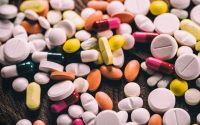High blood pressure diet: Cutting down on certain breakfast drinks could reduce your risk
High blood pressure: Lifestyle changes to reduce reading
We use your sign-up to provide content in ways you’ve consented to and to improve our understanding of you. This may include adverts from us and 3rd parties based on our understanding. You can unsubscribe at any time. More info
High blood pressure levels are estimated to impact around 14.4 million UK adults. High blood pressure, or hypertension, can be treated with a number of lifestyle changes, including switching up your diet and incorporating more exercise into your daily routine.
Unfortunately, high blood pressure does not always have obvious symptoms or warning signs.
Instead, it is most commonly picked up at routine blood pressure checks from GPs.
Some people also purchase their own blood pressure machines which can be used at home to check their levels.
According to the NHS: “Ideal blood pressure is considered to be between 90/60mmHg and 120/80mmHg.
“High blood pressure is considered to be 140/90mmHg or higher.


“Low blood pressure is considered to be 90/60mmHg or lower.”
Though hypertension, in many cases, has to be treated with medication, doctors may also recommend patients make lifestyle amendments to reduce their risk.
According to the NHS, caffeine can be a major player in heightened blood pressure levels.
Caffeine is found in popular drinks, including coffee and tea, often enjoyed with breakfast.
However, this natural stimulant can cause a short but dramatic increase in blood pressure – even among people who have healthy blood pressure levels.
DON’T MISS
Dave Myers health: The Hairy Biker ‘devastated’ after diagnosis [COMMENT]
Bowel cancer symptoms: The ‘sensation’ when having a poo – sign [WARNING]
Parkinson’s: The hot drink that ‘significantly’ lowers your risk [INSIGHT]
The response to caffeine varies from person to person, but in some cases, your doctor may advise against drinking caffeine – especially if you already suffer from hypertension.
The NHS recommends people who are suffering from high blood pressure levels should consider “cutting down” on caffeine-rich drinks.
It explains: “Drinking more than four cups of coffee a day may increase your blood pressure.
“If you’re a big fan of coffee, tea or other caffeine-rich drinks, such as cola and some energy drinks, consider cutting down.”
In most cases, this does not mean eliminating coffee or tea altogether.
The NHS recommends: “It’s fine to drink tea and coffee as part of a balanced diet, but it’s important that these drinks are not your main or only source of fluid.”

How else can I reduce the symptoms of hypertension?
The NHS recommends a number of lifestyle changes in order to reduce the risk of high blood pressure. This includes consuming a “healthy diet”.
A healthy balanced diet is considered one which is rich in fruit and vegetables, and low in salt.
The NHS warns: “Salt raises your blood pressure. The more salt you eat, the higher your blood pressure. Aim to eat less than 6g (0.2oz) of salt a day, which is about a teaspoonful.”
People should also aim to eliminate the amount of fat in their diet and increase the amount of whole grain and fibre they eat.
Another key thing to consider is how much alcohol you drink in a week.
While the occasional tipple should not cause too much damage, the NHS explains warns that regular alcohol consumption can raise your blood pressure over time.
The NHS states: “Staying within the recommended levels is the best way to reduce your risk of developing high blood pressure.
“Men and women are advised not to regularly drink more than 14 units a week. Spread your drinking over three days or more if you drink as much as 14 units a week.”
A consistent exercise plan can also work wonders for reducing the risk of hypertension.
The NHS states: “Being active and taking regular exercise lowers blood pressure by keeping your heart and blood vessels in good condition.”
Adults are advised to partake in at least two hours and 30 minutes of moderate-intensity aerobic activity every week.
Source: Read Full Article


